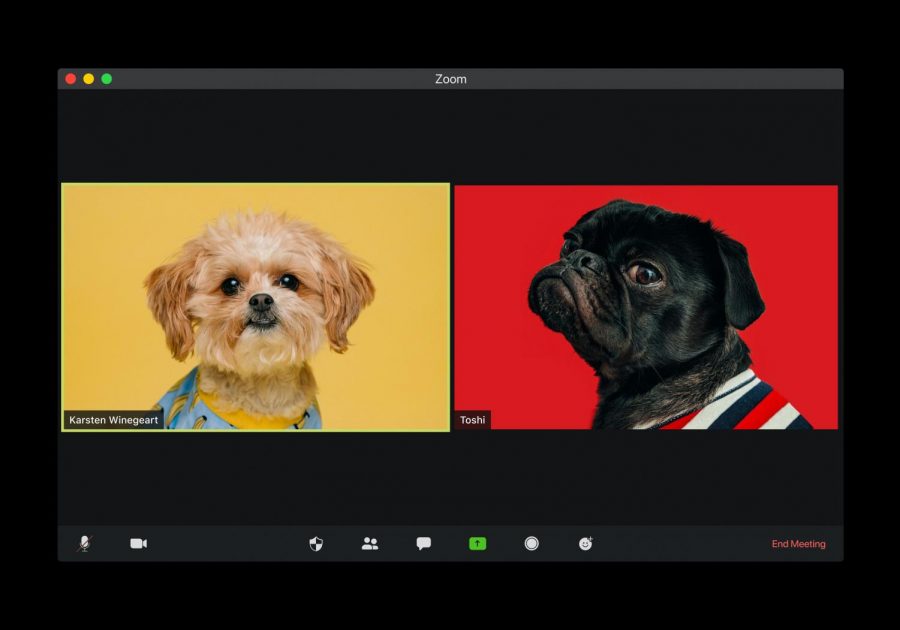Online interviews are less effective than in-person ones
Zoom has quickly become one of the most common mediums of online interaction. Colleges are beginning to utilize Zoom for online tours, information sessions, and now online interviews.
November 11, 2020
With COVID-19 altering the way the world runs, nearly everything around us has changed. Whether it is getting lunch with friends or taking a unit test over Zoom, major aspects of our lives are drastically different. With college applications on the horizon, college interviews will have to be held online, changing the interpersonal dynamic of a typical conversation.
When interviews are in-person, the people involved are able to truly interact with one another. This is virtually impossible when interviewing online. It is a totally different feeling, one that does not allow for any sort of learning or connection.
The Handshake
The typical in-person interview starts off with a handshake. Though a handshake seems insignificant, it typically makes a lasting imprint on your interviewer. In fact, according to research from the University of Iowa, hand shakes are, “more important than agreeableness, conscientiousness, or emotional stability.” The handshake is always crucial, allowing interviewees to make a great first impression and start the interview off strong. The equivalent to a handshake in an online interview is nothing more than a weak wave and an awkward smile at the camera. This prevents the interviewee from ever getting the chance to make a good impression, making the interview a little unmemorable.
Eye Contact
One of the main aspects of in-person interviews is eye contact. It shows you are a confident interviewee, one who knows what they are talking about and can maintain a sociable conversation. Not only does direct eye contact show you are a good speaker, it also shows you are a good listener. Maintaining eye contact with the interviewer will show them that you are engaged and want to answer their questions to the best of your ability. Unfortunately, with interviews being conducted online, there is very little eye contact. It is almost impossible, as many people do not stare directly into their camera. Even if you stare directly into your camera, you may still not be locking eyes with the interviewer. With no eye contact, it is difficult for a connection to be formed, and makes the interview disjointed.
Conversation Flow
An interview has to be smooth. If an interview seems to be one-sided and in question-answer format, then it is often an unsuccessful interview. It is a lot easier to have an in-person interview because it allows interviewers and interviewees to feed off each others’ energy and flow. You can read when you are supposed to speak and when your interviewer is done speaking. However, when you are interviewing online, it is much harder. There will be awkward pauses and silences. Sometimes you will stumble over your interviewer, cutting them off mid-sentence, or vice versa. Asking questions is another extremely important part of an interview and when you are unable to gauge the feel of the conversation, you will never know when to ask questions.
Body Language
Another important aspect of online interviews is body language. If you are slumped, your interviewer will be able to tell you are not interested or engaged. If you are leaning forward, it is easy to tell you want to be talking to your interviewer, that you are eager to ace the interview. There is no shortage of body language cues that will let your interviewer know you are a confident, capable candidate. However, it is hard to see these cues through Zoom. Your interviewer can only see a very small portion of your body, and they will not be able to see how you carry yourself.
Technological Difficulties
There has been no shortage of technological difficulties during online school. This will only be amplified during the interview process when it is one-on-one. During online school, you cannot see when a fellow student’s internet connection cuts out. However, during a one-on-one interview, it is embarrassing when you cut out or lag. If your connection is bad, your audio may cut out or you may sound like a robot to your interviewer. It will be impossible for your interviewer to hear the tone of your voice, making it hard for them to tell your mood or what words you are emphasizing. Or worse yet, they may not be able to understand you at all. This also creates the nightmare scenario of asking your interviewer to repeat their question for the fifth time in a row.
Additionally, if someone does not have a camera, there will be virtually no connection at all. It will be an impersonal interview and your interviewee will not be able to learn much about you.
Another important thing to consider is the lack of access to technology that many in the U.S. struggle with. In rural areas, internet connectivity is weaker meaning they may not even be able to connect to the interview. Some students may even lack technology that is strong enough to support popular interview mediums such as Zoom and Skype. This will completely cut them off from online interviews.
Obviously online mediums are the only possible way to conduct interviews right now. However, if circumstances ever allow in-person interviews to resume, this is the direction colleges and employers should move towards. They may be a little less convenient, but they are the best way to connect with your interviewer and show them you are the perfect candidate for their school.


